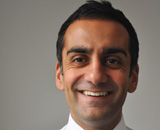 “We cannot solve our problems with the same thinking we used when we created them”—Albert Einstein
“We cannot solve our problems with the same thinking we used when we created them”—Albert Einstein
Healthcare is broken, nowhere more so than in the US where they spend 18% of GDP on it and achieve only the 37th best (sic) outcomes in the world. How healthcare got here is a sad tale of self-interest and insularity propagated by the mythical sanctity of clinicians’ knowledge—doctors know best, you wouldn’t understand, leave it with us.
And yet orbiting around the patriarchy of the doctor-patient relationship is nothing short of a frenetic storm of apparently important new research, not-to-be-missed conferences, earth-shattering news, and finger pointing debates. Roll-up, roll-up, healthcare is on the move!
It’s not, though. Nor is it likely to be any time soon.
Healthcare is big business, whether public or private funded, and big business is simply not equipped to innovate (Apple being the oft-cited exception that only proves the rule). With so much existing revenue at stake, most big business only dabbles at change. A friend of mine is tasked with innovation at a multi-billion dollar company but admits that he is nothing more than an “incrementalist”—he makes tweaks, and commercially safe ones at that.
Healthcare doesn’t need commercially safe tweaks; it needs courageous reinvention. It needs big ideas. It needs new thinking.
Thinking is out of vogue. In our hyper-connected world of beeping phones, unanswered emails, trains to catch and meetings to attend, taking a moment to think is considered bourgeois, indulgent, downright selfish. Why haven’t you answered my email?! I was thinking. It’s simply an unacceptable response. And yet think we must.
TEDMED wants to help people think. It wants to create an environment where ideas are shared, innovation is show cased, people are encouraged to imagine, and connections are created. It carefully curates not just its stage programme but also its audience, the aim being that up to 50% of both come from outside of health and medicine.
I’ve recently joined TEDMED as the clinical editor in their core editorial team. My job is to ensure it has a credible, reproducible methodology for designing its stage programme. I’ve built a number of methodologies in my career, all aligned to the strategic needs of the business I was working for (they usually needed clinical credibility). I find it easy because I’m a reductionist—I break things down to measurable units and then measure and measure and measure.
Quite fittingly for TEDMED, I need to think differently because the unit that matters in a conference about new thinking is “inspiration.” The last time I looked the International System of Units does not have a standardised unit for inspiration. My comfort zone sits cobwebbed at the departure gate at Heathrow (TEDMED are headquartered in Stamford, Connecticut, USA).
There are, of course, some easy things to measure. Does the stage programme cover the big issues in health and medicine, such as the tsunami of non-communicable diseases or the ludicrous amount of money we spend on end-of-life care because of our cultural denial of death? Are we getting adequate representation of society given that health is a social issue not just a medical one? And do we have representation of all areas of the clinical pathway, from determinants of health to prognosis? This is my bread and butter.
But to inspire, TEDMED needs to “wow” people out of their current thinking. It needs a fair amount of “whizz-bang” innovation for people to imagine the art of the possible. And it needs thoughtful “personal stories” that lay stark the human element of health. My bread and butter this is not.
The wow, whizz-bang and personal cannot just be vapour ware—the shiny toys of today that so often become the embarrassing uncles of tomorrow. This is not the world of randomised, controlled trials and yet some road testing in the real world is needed. Quite what “some” means will likely keep me awake until April 2013 when I’ll start to sense the audience reaction to the presenters and topics that we give the much sought-after stage to.
Wish me luck. My teammates, John Benditt, Lisa Shufro, and Lindsay Potter, seem more comfortable with the challenge (and find my reductionist struggles humorous), which is a comfort. I hope that, together, we’ll be able to inspire through our curating. And I hope that we’ll catalyse courageous reinvention, big ideas, and new thinking.
I still wish I could measure it, though.
Competing interests: I am a paid consultant to TEDMED
Pritpal S Tamber is the director of Optimising Clinical Knowledge Ltd, a consultancy that helps organisations improve how they use established clinical knowledge. He was previously the medical director of Map of Medicine Ltd, a company that creates clinical pathways to help health communities design services. He was the editorial director for medicine for BioMed Central Ltd and he was also the managing director of Medicine Reports Ltd. He has twice been an editor at the BMJ, the first time as the student editor of the Student BMJ.
